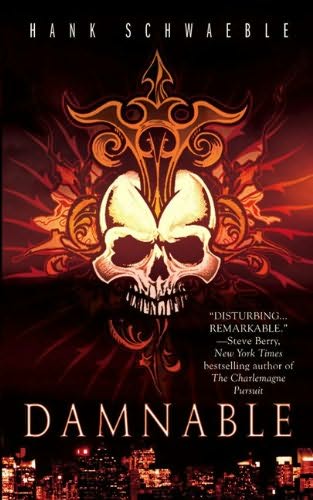 Damnable, by Hank Schwaeble, has been called noir, but anyone who has seen The Third Man, Double Indemnity and The Asphalt Jungle will see no more than a tenuous connection to what noir originally was. Just like the word libertarian often gets applied to anyone who is pro-choice on two or more issues, noir gets thrown at any tale with a dark atmosphere, a detective and/or so much as a single morally ambiguous character, resulting in an abundance of wrongly labeled people and stories. Damnable, winner of the 2009 Bram Stoker Award, is not noir any more than Bill Maher is a libertarian; it is a mix of detective tale, supernatural story full of demons and cultish rituals, and MMA-style fighting and action.
Damnable, by Hank Schwaeble, has been called noir, but anyone who has seen The Third Man, Double Indemnity and The Asphalt Jungle will see no more than a tenuous connection to what noir originally was. Just like the word libertarian often gets applied to anyone who is pro-choice on two or more issues, noir gets thrown at any tale with a dark atmosphere, a detective and/or so much as a single morally ambiguous character, resulting in an abundance of wrongly labeled people and stories. Damnable, winner of the 2009 Bram Stoker Award, is not noir any more than Bill Maher is a libertarian; it is a mix of detective tale, supernatural story full of demons and cultish rituals, and MMA-style fighting and action.
This is not to denigrate the work — or Bill Maher — but merely to put it in its proper category. As a story it is a modest success, not profound perhaps, but also without pretensions of depth and nuance. On the first page, a character muses, “Coffee was like pizza and sex — no matter how bad it was, it was usually still pretty good.” In other words, the author is decent enough to tell us straight away we will not be wrestling with complex ideas and weighty issues. When a zombie attacks a few paragraphs later, it is the author letting us know what we will be doing.
I enjoyed my time with the novel, which I believe is all the author ever wanted for his readers. I know I enjoyed it because I put my book mark in the sequel as soon as the last page was turned. The main character, Jake Hatcher, is something more than one dimensional, interesting from the outset. His situation is intriguing, his history morally ambiguous, and his abilities perfect for the action to follow.
We first meet Jake as a convict in a military prison. One of his jailors has it out for him, and Jake suspects his cellmate has been recruited to pick a fight with him, to get him in trouble so his term can be lengthened. There is also another trap his jailor has set for him, and while he tries to navigate these he gets a call from his mother telling him his brother has died, an event we saw in the prologue.
Jake is a former interrogator for the army. While he indicates to the reader that he stopped short of some of the grosser abuses of prisoners, there are also hints that he did not disdain to get his hands a little dirty. He has a keen eye for detail, a quick mind, and a very high level fighting ability. We have seen this before in action characters, but Jake does stand out for the particulars of his ethical uncertainty.
The book also benefits from a number of clever hooks at the end of chapters, particularly the early ones. I defy anyone to read the end of chapter one and not immediately start chapter two. This by itself would make it a page turner, and together with the interesting protagonist it has what it needs to win the reader’s good opinion.
There are some aspects of the book that could be improved, however. Nothing critical but not trivial either. For instance, Jake Hatcher is too successful at reading small clues and drawing precise conclusions. One evening, not long ago, I found myself watching some detective show where the investigators put together a profile of a serial killer based on conclusions they drew from how he operated. The super sleuths made confident predictions about where the murderer must live, what happened to him in his childhood, why he was doing what he was doing, what his phobias were — just about anything you could want to know about him. None of them were bad guesses, per se, but the problem is that they were not treated as guesses. Every prediction proved accurate, as if there could be only one explanation for why a killer dumped the bodies in a particular location, or why he used a knife instead of a gun. This does not bear even a passing resemblance to real life.
Damnable, though not as egregiously as that TV show, gives these same almost psychic powers to Jake Hatcher. And Hatcher always takes decisive action based on his conclusion, action the results of which could sometimes be disastrous if he is wrong.
SPOILER SPOILER SPOILER
He never is, save in one instance where it furthers the plot. Even this case is an example of another character having these same, mystical psychological powers of prediction and using them against Hatcher.
END OF SPOILER

The story alternates between Jake Hatcher’s investigations and the villain’s machinations. I think it would be a big improvement to leave out the villain’s perspective. We would know less, which would make the investigation more gripping. Sometimes, the reader needs to be left in the dark for a while. The very little we learn from the villain that is profitable for the reader to know should be delivered in another way, and the scenes with him lack a little luster anyway. When we know his name, have a good idea of what he is after and know his methods, the mystery’s seductive quality is diminished. A fly on the wall in the villain’s quarters experiences a good deal less uncertainty, and therefore a good deal less excitement, than the reader ought to. Better to experience the story as Hatcher does, in my opinion. Ignorance can be a good thing.
There is also, towards the end, a brief period when the story goes slack. The separate threads don’t crescendo in unison, the result being a dead period that is filled with a pointless trip to the police precinct where Hatcher, who has already spent considerable time in an interrogator’s office, is questioned yet again, but this time for no important reason. Nothing is introduced, no new information given and the plot is neither advanced nor altered. It is just a bit of time-killing until five thirty p.m. so the plot can get started again. It doesn’t last long, but if the narrative were restructured to eliminate this void between plot points, the work would benefit.
My last complaint is the enormous complexity of the antagonist’s scheme. There is an Occam’s Razor for any plan: go with the simplest one. A convoluted design will have too many opportunities to fail, and in Damnable the villain’s plot could have failed any number of different ways. Somehow, he is able to guess exactly how his pawns will behave in each situation, or that they will be able to figure out a very obscure clue he leaves for them. It strains credulity to the breaking point. He even puts his own life in danger, dependent upon Hatcher doing what he predicts through his psychological study of him. No one is that predictable, and given how obsessed the villain was with his goal — how desperate he was to achieve it — one would imagine he would take the surest path to success. The very end of this plot features a trap of such complexity, complete with a villain monologue and ticking clock, that I actually sighed in disappointment.
Complaints aside, the book was entertaining. The author went in with some inspired plot twists and created the right protagonist for the story. There is a moral ambiguity to Jake Hatcher, as well as some unique particulars, that lift him above the level of a one dimensional, cookie-cutter character. A number of things could have been improved, but the heart of the story is strong enough to survive the flaws, like an automobile that still runs well despite a few fender-benders.
Like I said, I was ready for the sequel as soon as I finished it. I have to give it a passing grade on that account.














